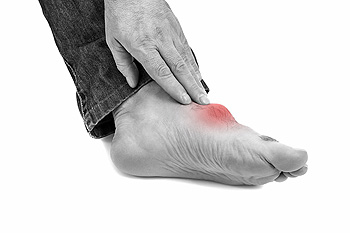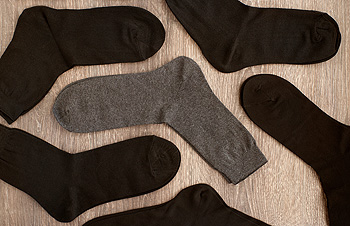April 2021
What Are the Causes and Risk Factors of Developing Gout?
Purine, a chemical compound, is naturally present in the body and in foods including certain meats and seafood, as well as alcohol. When purine is broken down, uric acid is produced. If the body cannot properly flush uric acid out, it may crystalize in the joints—causing inflammation, pain, stiffness and even deformity in extreme cases. This condition, known as gout, is a form of arthritis which most commonly occurs in the metatarsophalangeal joint connecting the foot with the big toe. Men are more likely to develop gout, as well as people with a family history of gout, or those who are over 50 years old. Other risk factors can include obesity, high blood pressure, abnormal kidney functions, and drug or alcohol abuse. In rare cases, children with certain genetic disorders that cause an excess of uric acid can develop gout. If you are in any of these high-risk groups and are experiencing pain or inflammation in any ankle or foot joint, contact a podiatrist who can examine you and may perform tests to analyze the fluid around the joint to see if uric acid crystals are present.
Gout is a painful condition that can be treated. If you are seeking treatment, contact Dr. Anna Petrov from Family Foot & Ankle Care. Our doctor will treat your foot and ankle needs.
What Is Gout?
Gout is a form of arthritis that is characterized by sudden, severe attacks of pain, redness, and tenderness in the joints. The condition usually affects the joint at the base of the big toe. A gout attack can occur at any random time, such as the middle of the night while you are asleep.
Symptoms
- Intense Joint Pain - Usually around the large joint of your big toe, and it most severe within the first four to twelve hours
- Lingering Discomfort - Joint discomfort may last from a few days to a few weeks
- Inflammation and Redness -Affected joints may become swollen, tender, warm and red
- Limited Range of Motion - May experience a decrease in joint mobility
Risk Factors
- Genetics - If family members have gout, you’re more likely to have it
- Medications - Diuretic medications can raise uric acid levels
- Gender/Age - Gout is more common in men until the age of 60. It is believed that estrogen protects women until that point
- Diet - Eating red meat and shellfish increases your risk
- Alcohol - Having more than two alcoholic drinks per day increases your risk
- Obesity - Obese people are at a higher risk for gout
Prior to visiting your podiatrist to receive treatment for gout, there are a few things you should do beforehand. If you have gout you should write down your symptoms--including when they started and how often you experience them, important medical information you may have, and any questions you may have. Writing down these three things will help your podiatrist in assessing your specific situation so that he or she may provide the best route of treatment for you.
If you have any questions, please feel free to contact one of our offices located in Wheeling and Chicago, IL . We offer the newest diagnostic and treatment technologies for all your foot care needs.
Special Socks for Arthritic Feet
If you have arthritis that affects your feet, wearing certain types of socks may help you manage your symptoms. Compression socks, which apply consistent pressure to the feet, can help reduce joint swelling and pain. Padded socks provide an extra layer of cushioning between your feet and your shoes or the floor and may make standing or walking more comfortable, in addition to helping prevent cuts and bruises on your feet. Heated socks can warm your joints and reduce the impact that the cold or living in a cold climate may have on your arthritis. To learn more about socks that can help you manage your arthritis, please consult with a podiatrist.
Arthritis can be a difficult condition to live with. If you are seeking treatment, contact Dr. Anna Petrov from Family Foot & Ankle Care. Our doctor can provide the care you need to keep you pain-free and on your feet.
Arthritic Foot Care
Arthritis is a joint disorder that involves the inflammation of different joints in your body, such as those in your feet. Arthritis is often caused by a degenerative joint disease and causes mild to severe pain in all affected areas. In addition to this, swelling and stiffness in the affected joints can also be a common symptom of arthritis.
In many cases, wearing ill-fitting shoes can worsen the effects and pain of arthritis. Wearing shoes that have a lower heel and extra room can help your feet feel more comfortable. In cases of rheumatoid arthritis, the arch in your foot may become problematic. Buying shoes with proper arch support that contour to your feet can help immensely.
Alleviating Arthritic Pain
- Exercises that stretch the foot can prevent further pain and injury and increase mobility
- Most of the pain can be alleviated with anti-inflammatory drugs, heat, and topical medications
- Massages can help temporarily alleviate pain.
It is best to see your doctor for the treatment that is right for your needs and symptoms. Conditions vary, and a podiatrist can help you determine the right method of care for your feet.
If you have any questions, please feel free to contact one of our offices located in Wheeling and Chicago, IL . We offer the newest diagnostic tools and technology to treat your foot and ankle needs.
Are Bunions Affecting Your Everyday Life?
What Is an Ingrown Toenail?
 An ingrown toenail forms when the nail grows into the skin instead of over it. While an ingrown toenail most often affects the big toe, it can affect any of the toes. Toenails can become ingrown due to a variety of factors that include cutting the nail too short, rounding the corner of the nail, or wearing shoes that are too tight, and they can also form from trauma, such as stubbing the toe. They are often painful and appear as red and swollen, and they can become infected as well. Nails that appear infected or severely ingrown should be checked and treated by a podiatrist. Patients who are diabetic or suffer from peripheral artery disease should also consult with a podiatrist if they are struggling with ingrown toenails.
An ingrown toenail forms when the nail grows into the skin instead of over it. While an ingrown toenail most often affects the big toe, it can affect any of the toes. Toenails can become ingrown due to a variety of factors that include cutting the nail too short, rounding the corner of the nail, or wearing shoes that are too tight, and they can also form from trauma, such as stubbing the toe. They are often painful and appear as red and swollen, and they can become infected as well. Nails that appear infected or severely ingrown should be checked and treated by a podiatrist. Patients who are diabetic or suffer from peripheral artery disease should also consult with a podiatrist if they are struggling with ingrown toenails.
Ingrown toenails can become painful if they are not treated properly. For more information about ingrown toenails, contact Dr. Anna Petrov of Family Foot & Ankle Care. Our doctor can provide the care you need to keep you pain-free and on your feet.
Ingrown Toenails
Ingrown toenails occur when a toenail grows sideways into the bed of the nail, causing pain, swelling, and possibly infection.
Causes
- Bacterial infections
- Improper nail cutting such as cutting it too short or not straight across
- Trauma to the toe, such as stubbing, which causes the nail to grow back irregularly
- Ill-fitting shoes that bunch the toes too close together
- Genetic predisposition
Prevention
Because ingrown toenails are not something found outside of shoe-wearing cultures, going barefoot as often as possible will decrease the likeliness of developing ingrown toenails. Wearing proper fitting shoes and using proper cutting techniques will also help decrease your risk of developing ingrown toenails.
Treatment
Ingrown toenails are a very treatable foot condition. In minor cases, soaking the affected area in salt or antibacterial soaps will not only help with the ingrown nail itself, but also help prevent any infections from occurring. In more severe cases, surgery is an option. In either case, speaking to your podiatrist about this condition will help you get a better understanding of specific treatment options that are right for you.
If you have any questions please feel free to contact one of our offices located in Wheeling and Chicago, IL . We offer the newest diagnostic and treatment technologies for all your foot and ankle needs.









